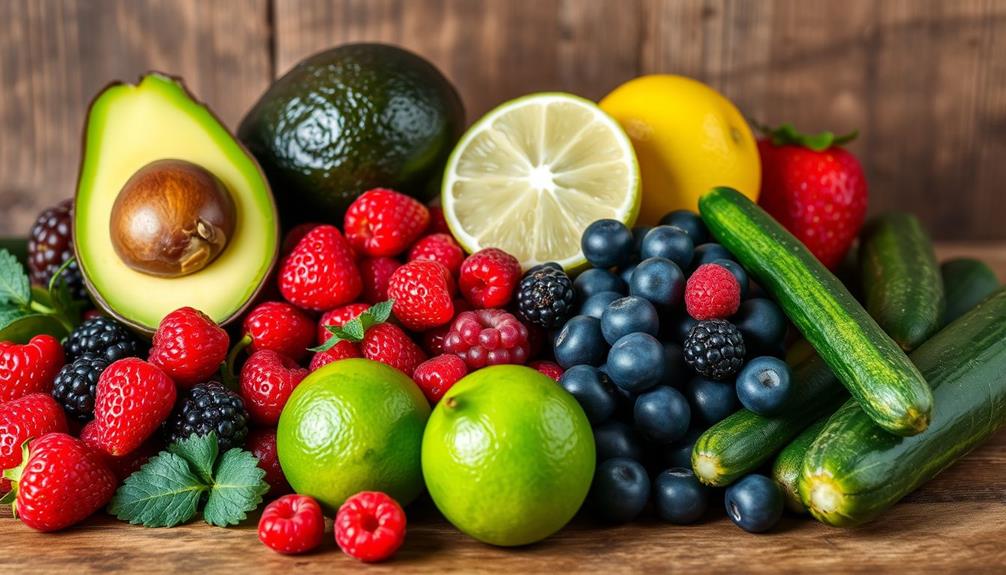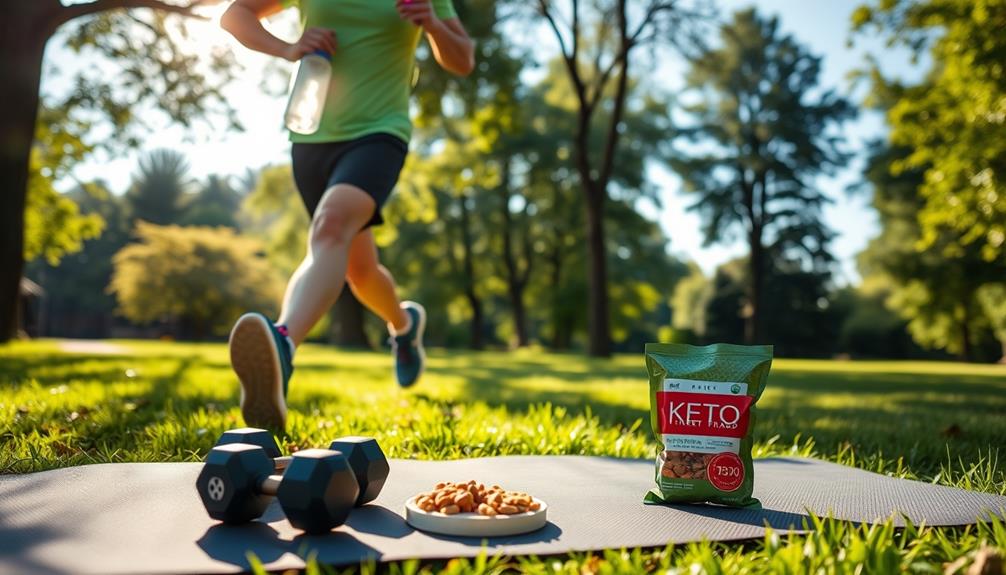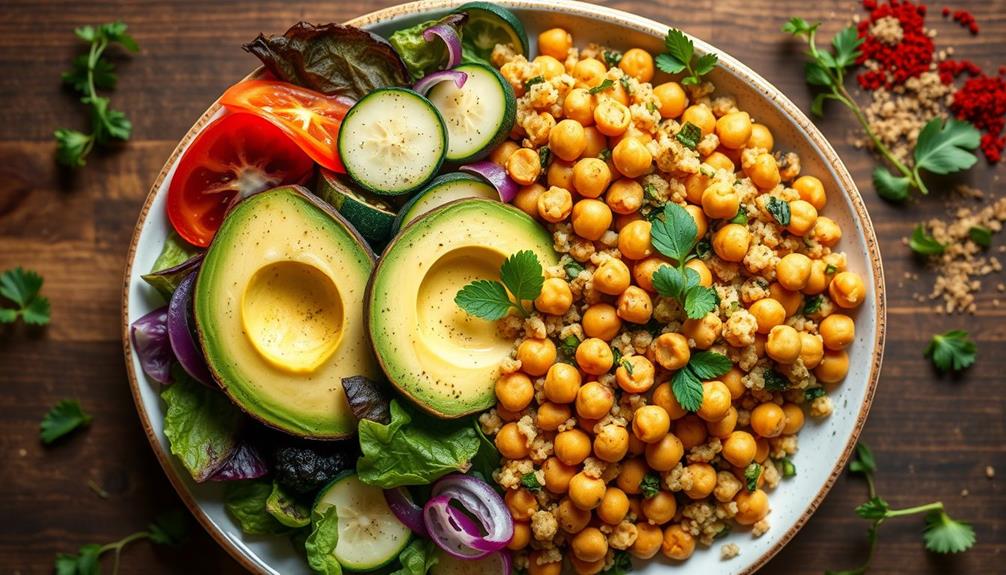Fruits can be a welcome addition to your keto diet, but you'll need to choose wisely. Low-carb options like avocados, berries, and lemons are great for keeping your carb count low while providing essential nutrients. Avoid high-carb fruits like bananas, grapes, and mangoes, which can disrupt ketosis. To stay on track, measure your servings and keep an eye on your total carb intake. Remember, fruits can enhance flavor and satisfaction, but moderation is key. By understanding what works for you, you'll make the most of your keto journey and discover more about effective fruit integration.
Key Takeaways
- Prioritize low-carb fruits like avocados, berries, and lemons to stay within ketosis limits.
- Avoid high-carb fruits such as bananas, grapes, and mangoes to prevent disrupting ketosis.
- Monitor portion sizes carefully to avoid exceeding daily carb intake.
- Incorporate fruits with healthy fats for better satiety and nutrition.
- Use tracking tools or apps to help maintain carb limits effectively.
Overview of the Keto Diet
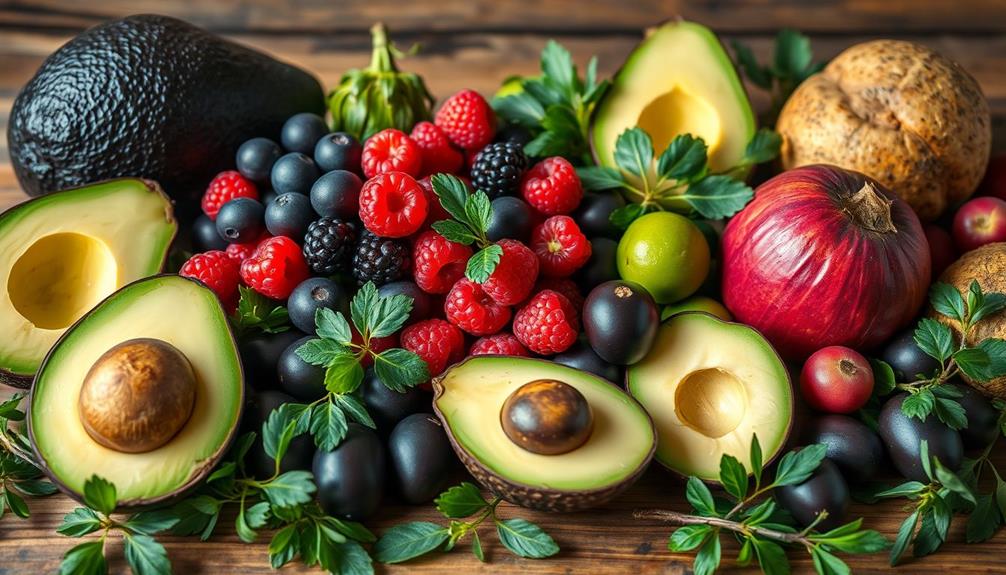
Understanding the keto diet begins with recognizing its core principle: drastically reducing carbohydrate intake to shift your body into a state of ketosis. By limiting carbs, you encourage your body to burn fat for energy instead, which can help with weight loss and improve metabolic health.
This dietary approach often involves careful budgeting of food choices, similar to creating a personal budget for financial health, where prioritizing high-fat foods while keeping net carbs low is vital. Emphasizing healthy fats over sugars or starches is significant, as it mirrors the importance of tracking your income to maintain financial stability.
It's important to monitor your carb intake to maintain ketosis effectively. Using apps or food logs can simplify tracking your consumption.
Low-Carb Fruits to Enjoy
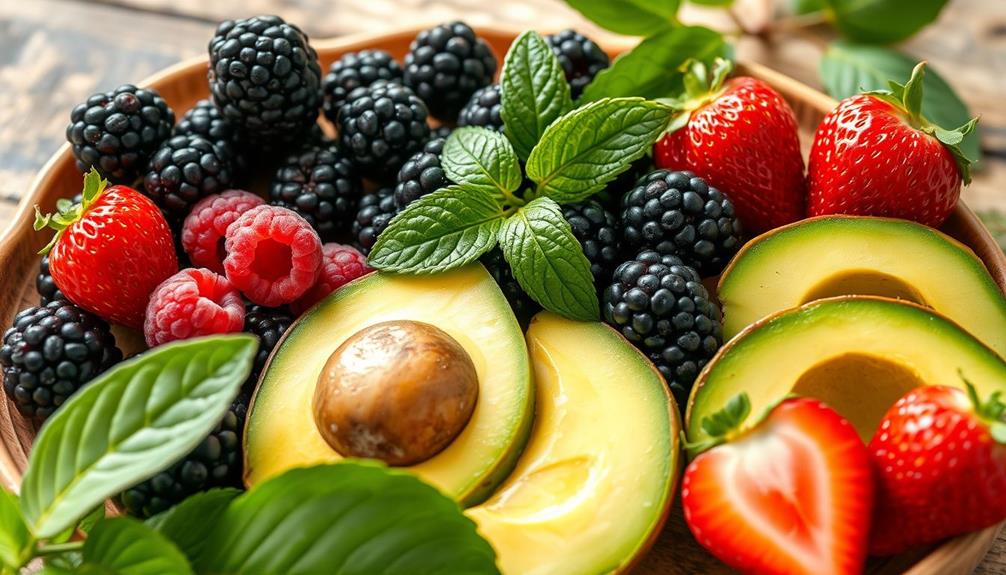
When you're following a keto diet, choosing the right fruits can make all the difference in maintaining your carb limits while still enjoying delicious options.
Focus on low-carb fruits like avocados, which have about 2g net carbs per 100g, or berries like raspberries and strawberries, offering around 5g net carbs per serving.
Additionally, fruits like lemons add a zesty flavor with only 3g of net carbs, while olives provide healthy fats along with minimal carbs.
It's important to monitor your hydration levels as you incorporate these fruits into your diet. Aim for a 1/4 cup of berries or half a small avocado daily.
These fruits not only satisfy your sweet cravings but also pack essential nutrients, helping you stay on track with your keto journey while enjoying tasty treats.
High-Carb Fruits to Avoid

Avoiding high-carb fruits is essential for anyone on a keto diet, as even small servings can quickly push you over your daily carb limits.
Fruits like bananas, grapes, mangoes, and dried fruits can be particularly problematic, as they contain significant amounts of sugars and carbs which can disrupt ketosis. For example, a medium banana has about 27 grams of carbs, while a cup of grapes packs around 27 grams too.
Mangoes are similarly high, with one medium fruit containing around 50 grams of carbs. Dried fruits, like raisins and apricots, are even more concentrated in sugar and carbs.
To stay on track, focus on reading labels and measuring portions. Being aware of the carb content in these fruits helps you maintain ketosis and achieve your weight loss goals without unexpected setbacks.
Selecting the right cold medication is important, as it can help manage symptoms that may interfere with your dieting efforts.
Health Benefits of Fruits

Fruits offer a range of health benefits that can enhance your overall well-being, even on a keto diet.
They're packed with essential vitamins and minerals, like potassium and vitamin C, which support various bodily functions. Low-carb fruits, such as avocados and berries, also provide antioxidants that help combat inflammation and promote heart health.
The fiber found in these fruits aids digestion and keeps your gut healthy, making your keto journey more enjoyable.
Additionally, incorporating fruits into your meals can satisfy your sweet cravings without derailing your diet.
By choosing the right fruits and monitoring your portions, you can enjoy these health benefits while maintaining your keto lifestyle.
Embrace the goodness of fruits to boost your nutrition and overall health!
Risks of Fruit Consumption
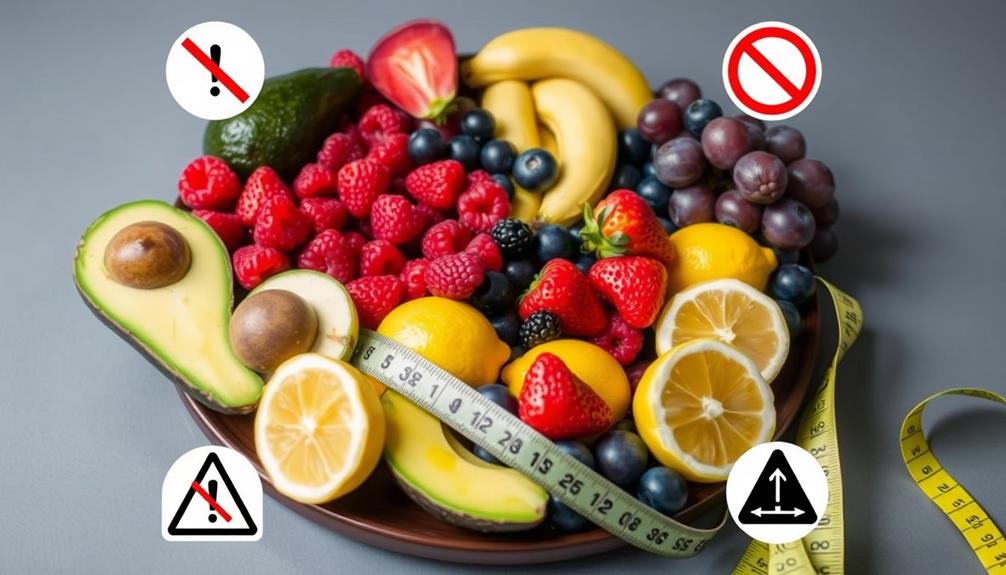
Many people overlook the potential risks of consuming fruit while on a keto diet. While fruits can offer essential nutrients, overindulgence can quickly push you beyond your daily carb limit.
High-carb fruits, like bananas and grapes, can lead to spikes in blood sugar, which disrupts ketosis and hinders weight loss efforts. Even small amounts of seemingly harmless fruits can accumulate and derail your progress.
It's vital to monitor how your body responds to different fruits, as individual reactions may vary. If you're not careful, you might find yourself struggling to maintain your desired state of ketosis, making it harder to achieve your health goals.
Always track your intake to stay on course with your keto journey.
Tips for Adding Fruits

To successfully incorporate low-carb fruits into your keto diet, start by identifying which options fit your meal plan without pushing you over your carbohydrate limits.
Here are some tips to help you enjoy fruits while staying on track:
- Choose wisely: Stick to low-carb fruits like berries, avocados, and lemons to keep your carb intake in check.
- Watch portions: Measure your servings; even low-carb fruits can add up if you eat too much.
- Pair with fats: Combine fruits with healthy fats, like nuts or yogurt, to enhance satiety and flavor.
- Track intake: Use a food diary or app to monitor your fruit consumption and guarantee you're meeting your keto goals.
Key Considerations for Keto Fruits
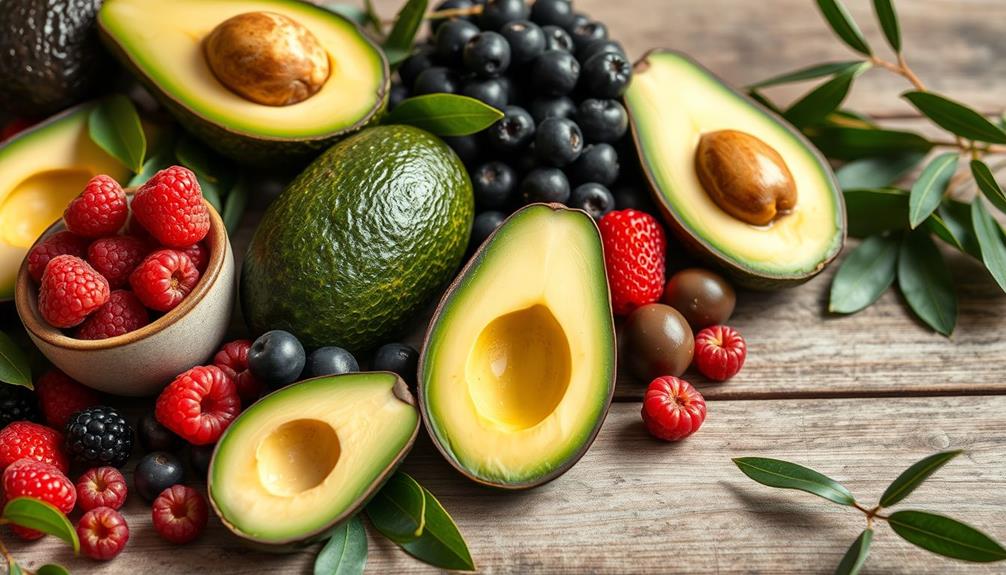
While steering through the keto diet, it's crucial to contemplate not just the types of fruits you consume, but also their portions and how they fit into your overall carbohydrate allowance. The keto diet focuses on restricting carbohydrates in order to promote the body’s use of stored fat as energy. Therefore, it’s important to prioritize low-carb fruits such as berries, avocados, and tomatoes while also being mindful of serving sizes. These considerations are essential secrets of keto success, as they help ensure that you stay within your daily carb limit while still enjoying the nutritional benefits of fruits.
Focus on low-carb options like berries and avocados, which provide important nutrients without derailing your progress. Always measure your serving sizes; a quarter cup of berries or half a small avocado can be a satisfying addition.
Keep track of your total carb intake to avoid exceeding your limits, as even small amounts of high-carb fruits can disrupt ketosis.
Frequently Asked Questions
Can I Eat Fruit Daily on a Keto Diet?
Yes, you can eat fruit daily on a keto diet, but you need to choose wisely.
Focus on low-carb options like berries and avocados, and watch your portion sizes to stay within your carb limits.
It's crucial to track your intake to avoid exceeding your daily allowance.
How Do I Calculate Net Carbs in Fruits?
Imagine traversing a maze, each twist revealing hidden treasures—those treasures are net carbs.
To uncover them in fruits, start by subtracting fiber grams from total carbs; the result is your net carb count. For instance, if a fruit has 10 grams of carbs and 3 grams of fiber, you've got 7 grams of net carbs.
Are Fruit Juices Allowed on a Keto Diet?
When it comes to fruit juices on a keto diet, you should be cautious.
Most fruit juices are high in sugar and carbs, which can easily push you over your daily limits and disrupt ketosis.
If you want to enjoy juice, opt for low-carb options like lemon or lime juice in small amounts.
Always check the nutrition labels and monitor your intake to guarantee you stay within your carb goals while enjoying your keto journey.
Can I Eat Fruit During Intermittent Fasting on Keto?
Sure, you can eat fruit during intermittent fasting on keto—if you're okay with breaking your fast!
Isn't that ironic? While fasting, your focus is usually on avoiding food. If you do choose to indulge, opt for low-carb fruits in moderation to keep your ketosis intact.
Just remember, timing matters. Enjoy your fruit when you're allowed to eat, and keep an eye on portion sizes to maintain your keto goals!
What Are Alternative Sweeteners for Fruit on Keto?
When you're looking for alternative sweeteners on keto, consider options like stevia, erythritol, or monk fruit.
These sweeteners provide sweetness without the carbs found in traditional sugars. You can easily use them in recipes or to sweeten beverages.
Just watch your quantities, as some can cause digestive issues if consumed in large amounts.
Experimenting with these options can help satisfy your sweet cravings while keeping your carb intake low and your diet on track.
Conclusion
Incorporating fruits into your keto journey can be both satisfying and nutritious. Did you know that just one cup of strawberries contains only about 11 grams of carbs? That makes it a perfect choice to curb your sweet cravings without derailing your progress. By understanding which fruits to enjoy and how to balance them within your carb limits, you can enhance your meals and health. So go ahead, savor the sweetness of keto-friendly fruits and enjoy the benefits they bring!
